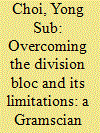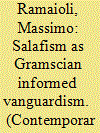|
|
|
Sort Order |
|
|
|
Items / Page
|
|
|
|
|
|
|
| Srl | Item |
| 1 |
ID:
174561


|
|
|
|
|
| Summary/Abstract |
Colonialism affects post-colonial social formations in a variety of ways. Japanese colonial rule had a far-reaching influence on South Korean post-colonial social formation. Most legacies of colonialism diminished as time went by, but one legacy of colonialism continued or even increased its effects on the South Korean political economy from the 1960s – namely, the division of Korea. This article provides an alternative Gramscian approach to the analysis of the social formation of South Korea, with due consideration of the division of the peninsula. For that purpose, it introduces the concept of a division bloc, adapting Gramsci’s concept of a historical bloc to develop an analysis of a social formation that is unique to South Korea. Then, I explicate the two events that have been most damaging for the division bloc – the 1997 economic crisis and the 1998–2007 inter-Korean reconciliation – describing them as an organic crisis and a hegemonic project, respectively. Following this, I present reasons why the counter-hegemonic efforts of liberal nationalists to overcome the division bloc failed.
|
|
|
|
|
|
|
|
|
|
|
|
|
|
|
|
| 2 |
ID:
191625


|
|
|
|
|
| Summary/Abstract |
In this study, I offer a categorization of Salafism based on the concept of vanguardism. Vanguardism suggests how Salafis inhabit the political domain, by posing as the vanguard of a privileged group endowed with a historical mission. Relatedly, I summon the Gramscian concept of “philosophy of praxis.” With this, I intend to reconfigure Wiktorowicz’s classificatory scheme predicated on too stark an opposition between ‘aqīdah (theory) and manhaj (method). The philosophy of praxis accounts for the inherent tension between these two domains. Such tension is manifest in Salafis’ ambiguities, compromises, internal rifts, ideological adjustments, and revisions. Two related Gramscian concepts, historical bloc and modern Prince, bring such considerations more immediately into the political. They highlight, respectively, the political-historical context in which Salafis operate and the political-historical role they play as instances of vanguardism. I then put forth my classificatory scheme in the form of a typology. One axis is represented by the attitude towards the “historical bloc” (pro or anti) and the kind of vanguard posturing that emerges out of it (support, creation, or activation). The other axis is represented by the specific framing of the “Enemy” category on the part of the Salafi vanguard (historical/institutional or essential/identitarian), and the stance they consequently assume towards it (compromise/accommodation or rejection/denunciation). The resulting classification offers six categories (accommodationists, partisans, delayers, agitators, mobilizers, and belligerents). Stressing the fundamental political nature of contemporary Salafism—its vanguardism—they account for its inscription in a specific, modern way of thinking and acting the political.
|
|
|
|
|
|
|
|
|
|
|
|
|
|
|
|
|
|
|
|
|